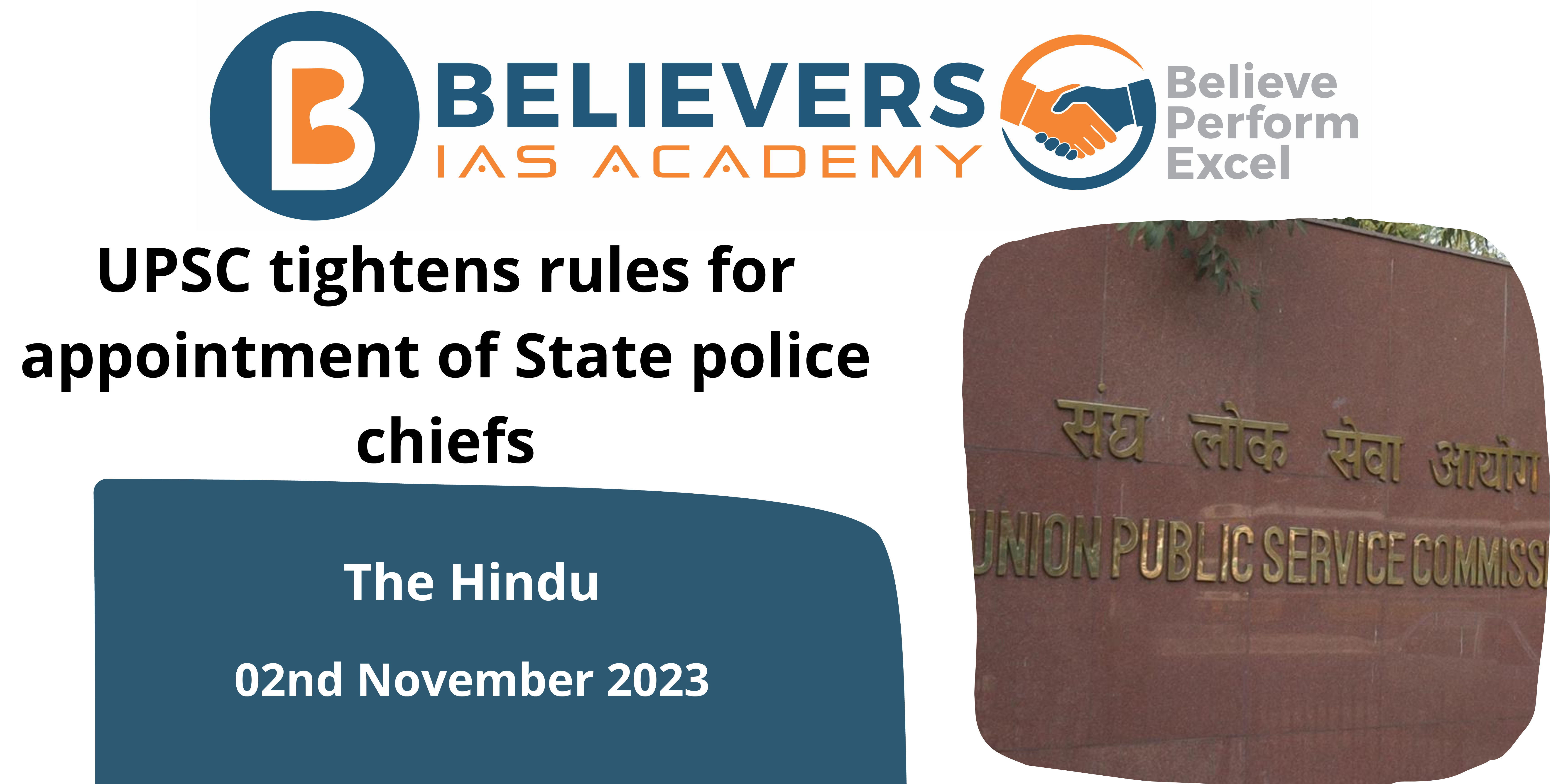UPSC tightens rules for appointment of State police chiefs
Context
Only police personnel having at least six months of service remaining before retirement will be considered for selection as a State’s Director-General of Police (DGP), according to modified rules announced last month by the Union Public Service Commission (UPSC).
What do we know about the post of Director-General of Police?
- DGP is a high-ranking position in the Indian Police Service (IPS) and is usually the highest-ranking police officer in a State or Union Territory. The DGP is normally in charge of the state or UT’s police force.
- Rank Insignia: A Director General of Police’s (or Commissioner of Police’s in Delhi) rank insignia consists of the national emblem over crossed swords and batons, denoting authority and leadership.
- Patches: DGP-ranking officers wear Gorget patches on their collars. These patches have a dark blue background with an embroidered oak leaf motif on them. This collar insignia resembles that of Additional Director Generals (ADGs) and Inspector Generals (IGs).
What are the appointments and responsibilities of DGP?
- Additional DGP Officers: In addition to the primary DGP, the state may have additional DGP officers. These individuals are in charge of the police force’s many specialized departments and bureaus. Director of Vigilance and Anti-Corruption Bureau, Director General of Prisons, Director General of Fire Forces and Civil Defense, Criminal Investigation Department (CID), and Police Housing Society are common postings for such officers.
- Appointments in Central Government: Officers with the rank of DGP may be appointed to positions in central government entities. Positions such as Director of the Central Bureau of Investigation (CBI), Director of the Sardar Vallabhbhai Patel National Police Academy (SVPNPA), and Director General of the Central Reserve Police Force (CRPF) are examples of such appointments.
What was the selection procedure for the post of the DGP?
- Nomination by the State Government: The selection of the Director General of Police of States, also known as the State Police Chief, is the result of a consultative process between the state government and the Union Public Service Commission (UPSC).
- UPSC Regulations: The state government is obligated by UPSC guidelines to submit the names of five senior IPS officials for consideration. The committee will return the suggestion to the state government after finalizing three names through a selection procedure.
- State Government Nomination: The state government is required to nominate the DGP from among the three final contenders. This procedure promotes consistency and consultation in the appointment of DGPs.
What are the amended guidelines for the appointment of the DGP?
- Eligibility for DGP Position: Only police personnel with at least six months of service remaining before retirement will be considered for nomination as a State’s Director-General of Police (DGP). This modification is intended to discourage the appointment of officers who are about to retire to extend their tenure.
- Assessment: The UPSC’s Empanelment Committee would not examine Indian Police Service (IPS) officials on Central deputation for a State DGP’s post if the Union Ministry of Home Affairs (MHA) declares that it will be impossible to relieve these officers. This clause is intended to ensure that officials on central deputation are not considered for DGP positions if they are unable to be released by the MHA.
- Experience Requirement: The rules now allow officers with 25 years of experience to be appointed as a DGP, which is a reduction from the prior requirement of at least 30 years of service.
- Number of Officers Shortlisted: The number of officers shortlisted for the position of DGP cannot exceed three, however, it may be less than three in extraordinary situations. Officers will be included on the panel only if they agree to be considered for the position.
Conclusion
These guidelines revisions aim to provide a more structured and consistent selection procedure for DGPs, ensuring that selection is based on merit and experience rather than political factors or attempts to extend the term of retiring officials.




